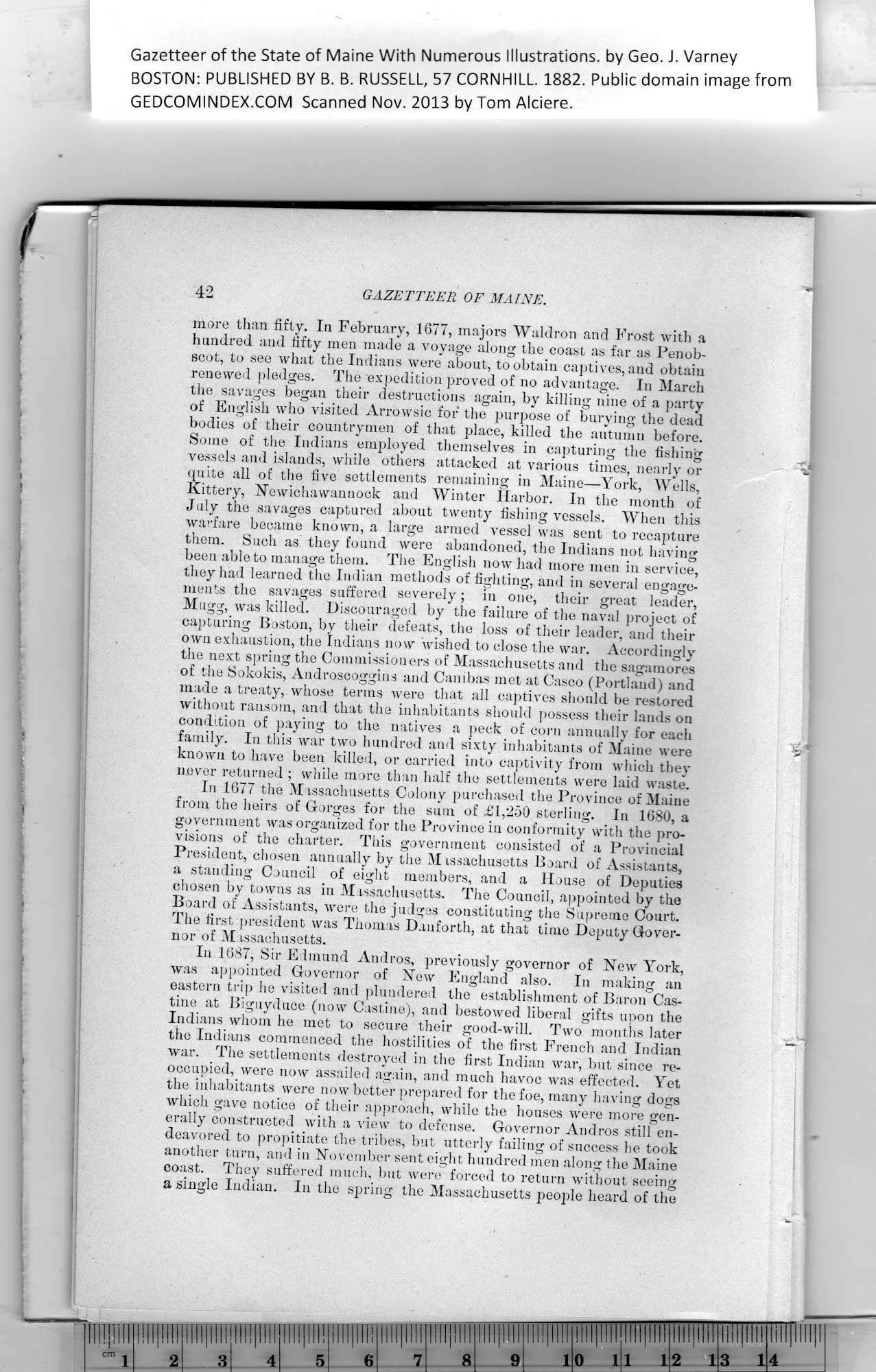|
Gazetteer of the State of Maine With Numerous Illustrations, by Geo. J. Varney
BOSTON: PUBLISHED BY B. B. RUSSELL, 57 CORNHILL. 1882. Public domain image from
42 GAZETTEER OF MAINE.
more than fifty. In February, 1677, majors Waldron and Frost with a
hundred and fifty men made a voyage along the coast as far as Penob-
scot, to see what the Indians were about, to obtain captives, and obtain
renewed pledges. The expedition proved of no advantage. In March
the savages began their destructions again, by killing nine of a party
of English who visited Arrowsic for the purpose of burying the dead
bodies of their countrymen of that place, killed the autumn before.
Some of the Indians employed themselves in capturing the fishing
vessels and islands, while others attacked at various times, nearly or
quite all of the five settlements remaining in Maine—York, Wells,
Kittery, Newichawannoek and Winter Harbor. In the month of
July the savages captured about twenty fishing vessels. When this
warfare became known, a large armed vessel was sent to recapture
them. Such as they found were abandoned, the Indians not having
been able to manage them. The English now had more men in service,
they had learned the Indian methods of fighting, and in several engage-
ments the savages suffered severely; in one, their great leader,
Mugg, was killed. Discouraged by the failure of the naval project of
capturing Boston, by their defeats, the loss of their leader, and their
own exhaustion, the Indians now wished to close the war. Accordingly
the next spring the Commissioners of Massachusetts and the sagamores
of the Sokokis, Androscoggius and Canibas met at Casco (Portland) and
made a treaty, whose terms were that all captives should be restored
without ransom, and that the inhabitants should possess their lands on
condition of paying to the natives a peck of corn annually for each
family. In this war two hundred and sixty inhabitants of Maine were
known to have been killed, or carried into captivity from which they
never returned ; while more than half the settlements were laid waste.
In 1677 the Massachusetts Colony purchased the Province of Maine
from the heirs of Gorges for the sum of £1,250 sterling. In 1680, a
government was organized for the Province in conformity with the pro-
visions of the charter. This government consisted of a Provincial
President, chosen annually by the M issachusetts Board of Assistants,
a standing Council of eight members, and a House of Deputies
chosen by towns as in Massachusetts. The Council, appointed by the
Board of Assistants, were the judges constituting the Supreme Court.
The first president was Thomas Danforth, at that time Deputy Gover-
nor of Massachusetts.
In 1687, Sir Edmund Andros, previously governor of New York,
was appointed Governor of New England also. In making an
eastern trip he visited and plundered the establishment of Baron Cas-
tine at Biguyduce (now Castine), and bestowed liberal gifts upon the
Indians whom he met to secure their good-will. Two months later
the Indians commenced the hostilities of the first French and Indian
war. The settlements destroyed in the first Indian war, but since re-
occupied, were now assailed again, and much havoc was effected. Yet
the inhabitants were now better prepared for the foe, many having dogs
which gave notice of their approach, while the houses were more gen-
erally constructed with a view to defense. Governor Andros still en-
deavored to propitiate the tribes, but utterly failing of success he took
another turn, and in November sent eight hundred men along the Maine
coast. They suffered much, but were forced to return without seeing
a single Indian. In the spring the Massachusetts people heard of the
PREVIOUS PAGE ... NEXT PAGE
This page was written in HTML using a program written in Python 3.2
|
